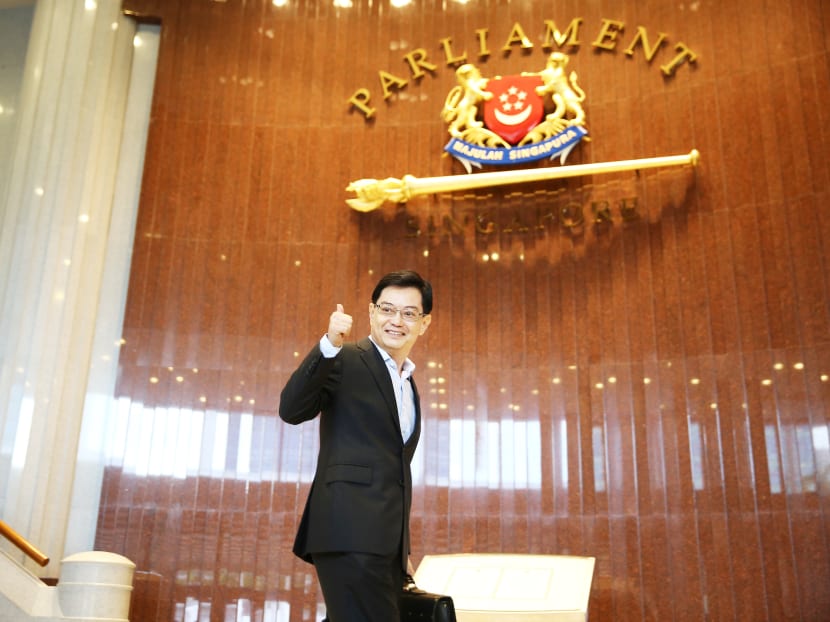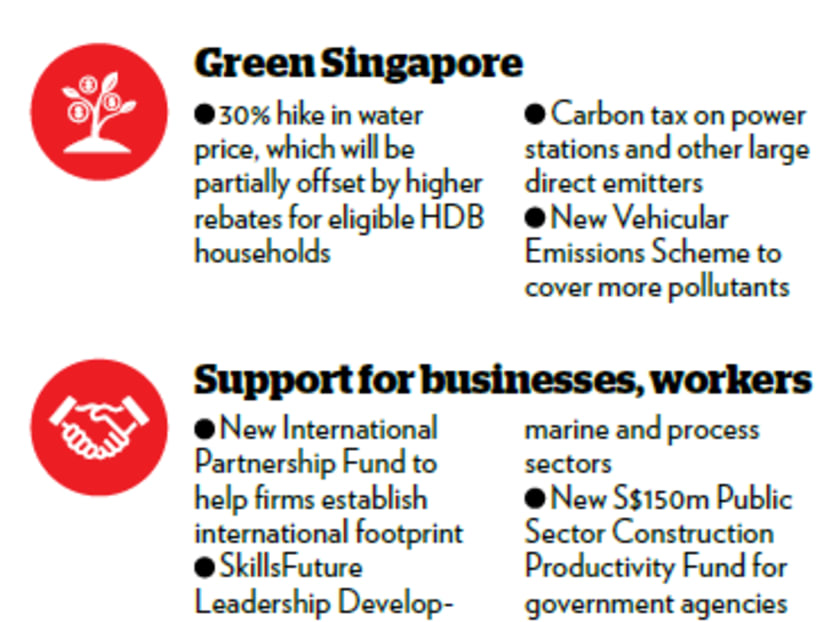Budget positions Singapore for the future
SINGAPORE — Making his first appearance in Parliament since he suffered a stroke in May last year, Finance Minister Heng Swee Keat was on Monday (Feb 20) greeted by his parliamentary colleagues with the thumping of armrests as he prepared to deliver the 2017 Budget, his second since taking over the finance portfolio.

Finance Minister Heng Swee Keat makes his first appearance in Parliament since he suffered a stroke in May last year. Photo: Nuria Ling
SINGAPORE — Making his first appearance in Parliament since he suffered a stroke in May last year, Finance Minister Heng Swee Keat was on Monday (Feb 20) greeted by his parliamentary colleagues with the thumping of armrests as he prepared to deliver the 2017 Budget, his second since taking over the finance portfolio.
Mr Heng set the stage for his speech by pointing out that the 11 months since his maiden presentation have been eventful ones.
“When I presented the last Budget, Brexit seemed remote, and the United States had just started the process of electing their new president. Events since then are a stark reminder of how quick and unpredictable change can be,” he said, after expressing appreciation for the good wishes that poured in after he had taken ill.
Since then, he said, an inward-looking mood has swept across several of the world’s most advanced economies, while advances in technology are picking up steam, disrupting traditional businesss and jobs.
With the Singapore economy at a key juncture and the world going through deep shifts, Mr Heng presented the policymakers’ response in a speech that ran for almost 1.5 hours: A S$75.1 billion Budget, the Republic’s biggest ever, that is aimed squarely at positioning Singapore for the future by building an innovative and connected economy. “It is critical that we take decisive action to re-position ourselves for the future,” he said.
While a main focus of the Budget was the future, it also continued on the path laid several years ago of building a more caring and inclusive society, while giving a nod to the overriding concern of the business community – overcoming sluggish conditions.
But Mr Heng devoted a sizeable portion of his speech to what Singapore must do to tap future opportunities, stressing the need to develop strong capabilities in its companies and workers, so they can adapt to the changes in economic structures and technology.
Monday’s Budget statement came less than two weeks after the Committee on the Future Economy (CFE) unveiled its strategies for Singapore’s economy, and Mr Heng outlined spending in several areas to support the initiatives. Among other things, small and medium enterprises (SMEs) will be given greater support to digitise their operations and to spread their wings overseas, while the new Global Innovation Alliance will help individuals and businesses connect with foreign counterparts to work on projects together. In all, some S$2.4 billion will be spent on CFE initiatives.

Singapore must also forge deep partnerships in the economy, as well as in society at large. The Government’s role is “not to plan every move, but to forge a common understanding of the changes, as well as foster partnerships with businesses, unions, firms and workers – with each playing a key role”, Mr Heng said.
Through digitalisation, innovation and equipping companies and individuals with the capital and know-how to make forays into foreign markets, the aim is for the Republic to prosper while staying open and connected to the world. And though the voices against globalisation are growing louder, Singapore must strive to remain a vibrant and well-connected city that is highly liveable for its people and businesses, Mr Heng said. Such an environment needs to be sustainable and resilient as well.
To that end, Mr Heng announced several green measures to protect the environment, including a new vehicular emissions scheme that takes into account more pollutants apart from carbon dioxide. From 2019. Singapore will impose a carbon tax – the first country in South-east Asia to do so – on power stations and other large direct emitters, rather than electricity users.
As signalled earlier this month, water tariffs will also go up by 30 per cent in two phases beginning on July 1, though households will be given rebates to partially offset the hike.
“It is the right thing to do... The Government will help households, especially low income ones,” Mr Heng said.
On efforts to support families and help the needy, Mr Heng noted that the Government has significantly increased social spending and strengthened safety nets. Additional support for families will be provided in Budget 2017 in the areas of housing, pre-school and post-secondary education. With Government expenditure continuing to grow, particularly in healthcare and infrastructure, Mr Heng said revenues have to be raised through new taxes or higher tax rates. Meanwhile, the Government must continue to spend judiciously: Ministries and organs of state will need to work with smaller budget caps, with a 2-per-cent cut taking effect as early as from the 2017 financial year.
Reacting to the Budget, several experts applauded the focus on girding for the future.
JPMorgan Securities Head of ASEAN Economic Research Ong Sin Beng, for one, described it as “a modestly expansionary budget, buffering the short-term, building for the long”. Mr Ong noted that SMEs will receive support through the Wage Credit Scheme and the working capital loan facility. “For the longer term, (the Budget) also looks to build capabilities to allow firms and workers access to global markets and technologies,” he said.
However, at least two trade associations felt more could be done to help businesses cope with the here and now.
The Singapore Business Federation (SBF) said it was disappointed with the “inadequate short-term support to lower business and compliance costs”. Agreeing, Singapore Chinese Chamber of Commerce & Industry (SCCCI) president Thomas Chua added that higher water tariffs and an increase in diesel tax would also hurt businesses. Neverthless, SBF and SCCCI welcomed the medium and long-term measures. “This is a long term budget that is aligned with the CFE recommendations... Businesses need to transform according to the new direction to capture new opportunities, create new revenue sources and to stay relevant,” Mr Chua said.
Parliament will debate the Budget next Tuesday.








